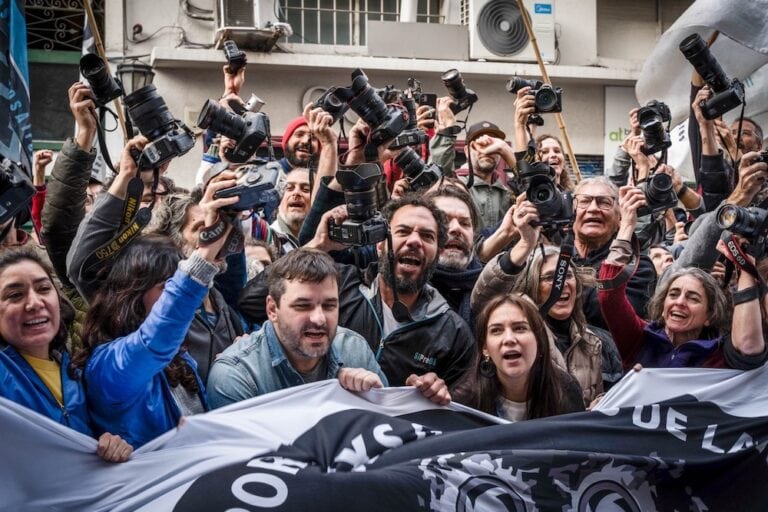(Periodistas/IFEX) – This is a 6 May 1999 Periodistas press release: **Updates IFEX alert of 9 November 1998** The Inter American Commission on Human Rights (IACHR) has agreed to examine accusations brought forward by PERIODISTAS for repeated violations of freedom of expression. On 31 March 1999, the IACHR decided to open a case against the […]
(Periodistas/IFEX) – This is a 6 May 1999 Periodistas press release:
**Updates IFEX alert of 9 November 1998**
The Inter American Commission on Human Rights (IACHR) has agreed to examine
accusations brought forward by PERIODISTAS for repeated violations of
freedom of expression.
On 31 March 1999, the IACHR decided to open a case against the Argentinian
state for repeated violations of freedom of expression, in response to
charges presented by PERIODISTAS, the Association for the Defense of
Independent Journalism.
The accusations, for violation of Articles 8.1 (on Judicial Guarantees) and
13.1 (Freedom of Thought and Expression) of the American Convention on Human
Rights, were submitted in the name of the Association by Horacio Verbitsky
to the Special Rapporteur of the Organisation of American States (OAS) for
Freedom of Expression, Santiago Canton. This occurred during the January
1999 gathering in Lima of non governmental organisations from Argentina,
Colombia, the United States, Mexico and Peru. On 31 March, the Commission
began legal proceedings, assigning number 12.128 to the case, and gave
notice to the Argentinian government, which now has to respond to the
charges.
The case against the Argentinian state refers to three Supreme Court
decisions: the sentence passed against actress Gabriela Acher and television
station Channel 13; the sentence passed against the editor of “Humor”
magazine, Tomás Sanz; and, the indefinite extension of the trial of Minister
of the Interior Carlos Corach against Verbitsky and the irregular handling
of this case by the Supreme Court, where two exhibits from the file
disappeared without explanation. The following is a synthesis of the cases:
Acher and Channel 13:
Actress Gabriela Acher presented a humorous sketch on the mistreatment of a
woman by the courts, on the programme “Hagamos el Humor” (“Let’s make fun”).
In the sketch, a woman with many children asks for food from a court room
which has a sign on it stating “Judge Cancela”. After a lot of persistence,
an employee gives the woman a potato chips bag. Judge Omar Jesús Cancela was
offended by this and was ordered to receive reparations after the Supreme
Court ruled that the humorous programme had negatively impacted on his
standing and personal honour.
Sanz:
The Supreme Court condemned the editor of the “Humor” magazine for an
article entitled “Special Report – Two years of corruption”. The article
named the President’s brother and National Senator Eduardo Menem, among
others. Menem charged the journalists and the editor of the magazine for
libel and insults.
Verbitsky:
After the 1991 publication of “Robo para la Corona”, Verbitsky was accused
of contempt and of offending Corach. The first instance court judge and the
Federal Chamber imposed a limitation period on the case, explicitly stating
that this did not apply to extensions requested by the defense, but by the
plaintiff and the courts. In 1998, the Supreme Court asked Verbitsky to
submit photocopies of documents needed to reconstruct the file, after two
exhibits were misplaced. Knowing that an absurd sentence was being prepared
against Verbitsky, his defense asked the court how and when this had
happened. In response, the Court responded that the file had reappeared.
When Verbitsky submitted another written request insisting in knowing what
had happened with the case, the Court responded that this was “restricted
information”. The Court rendered the statute of limitations inoperative and
re-opened the trial, further stating that each new edition of the book was
recommitting the offencse. Verbitsky denounced the fact that, with this
perverse game, he was being prevented from presenting the extensive proof he
had of Corach’s manipulation of the courts, and a lawsuit that was meant to
intimidate him was being left open indefinitely.
The charges brought by PERIODISTAS to the Inter American Commission state
that, since its expansion, “the Court has stopped being a counter power,
keeping a watch over citizens’ rights, and has instead become a body that
ratifies the Executive’s decisions.” Furthermore, “in the three related
cases, both the domestic law and international human rights law have been
interpreted in bad faith, with the clear intent to encumber freedom of the
press, one of the pillars of control over the conduct of public officials.
This is evidence of the fact that the Argentinian state does not guarantee
an impartial and independent judiciary that is capable of constructing a
democratic society, as required by international human rights law.” The
conviction in the Verbitsky case is considered invalid, because of strong
suspicions of lack of impartiality and independence, and because of the
apparent imposition of censorship by indirect means. In the Acher and Sánz
cases, the Court forgot about the San José Pact and the considerable
international jurisprudence that places freedom of expression in a
preferential position above individual honour where state officials,
politicians and public figures are concerned.


